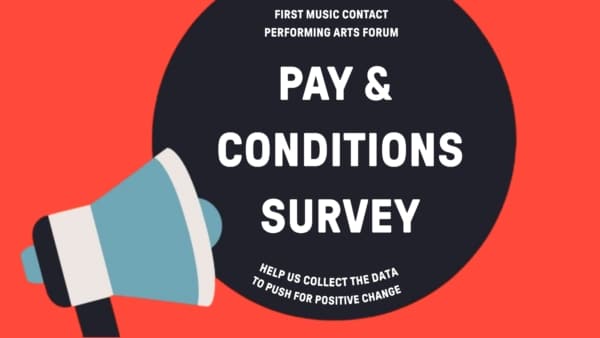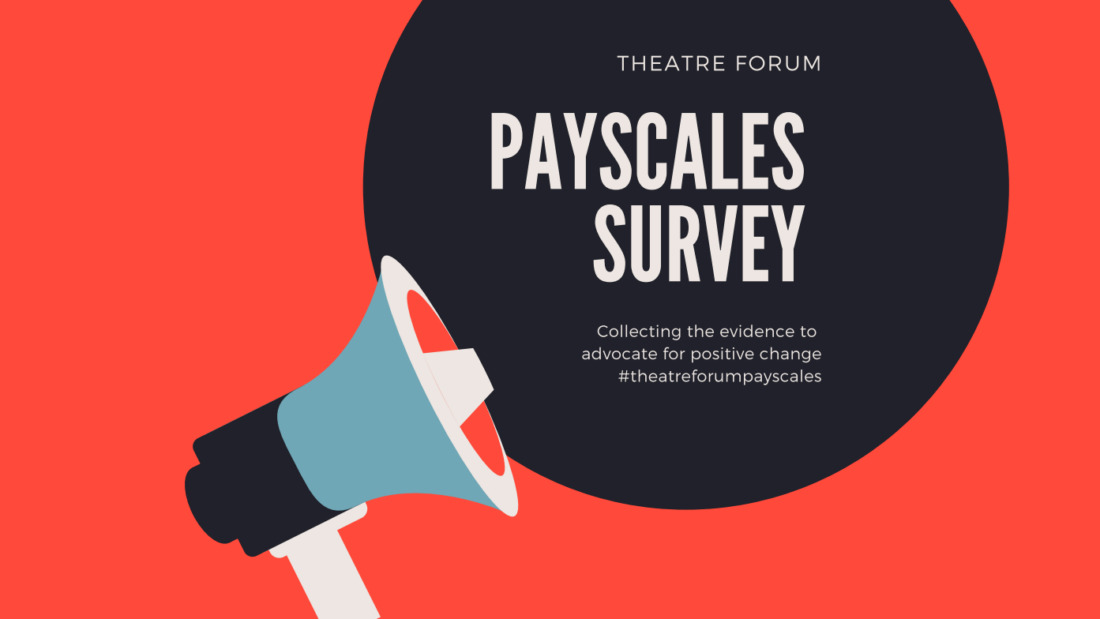Monday 18 October, 11am-1pm, Zoom
On Monday 18 October, we held an Open Forum to talk about the actions needed to change artist and arts workers’ pay and conditions for the better.
Our speakers were:
Heather Maitland, Sharon Barry, Amir Abu Alrob, Gerry O’Brien, Rena Bryson, Dan Colley, Sheila Creevey, Hugh Farley, Mairead Folan, Declan Gorman, Lucy Medlycott, Padraig Naughton, Madi O’Carroll, Diane O’Connor, Peter Power, Elizabeth Whyte, Catherine Young.
Watch back session:
Access Otter.ai transcript of the session (please note this is an AI recording).
Context
Theatre Forum’s Review of Pay and Conditions in the Performing Arts in Ireland in 2019 and 2020 pointed to a further deterioration of pay and conditions in our sector. The Payscales 2019-2020 survey findings will be used as evidence to support the case for the Basic Income pilot scheme as well as helping identify the systemic changes you want to see in the performing arts.
Here’s a link to Heather Maitland’s Payscales Survey 2019-2020 report and its main findings are detailed below.
You can watch Heather present the findings here.
Workshop – Tax for Artists and Arts Workers
Monday 18 October, 1.15pm-2.15pm
Following a short break after the morning’s Open Forum, Peter Daly will return to our screens to answer your 2019/2020 tax return questions as well as looking ahead to 2021. This tax conversation will also take account of Budget 2022 announcements on 12 October. Please register separately for this Workshop which is for anyone preparing to file their tax returns in the next few weeks.
Your tax questions
Send your questions for Peter in advance to director@theatreforum.ie to prioritise the tax topics and questions to be covered in the Workshop. Let us know if we can include your question, anonymised, in the FAQs which we’ll publish with an updated Tax Factsheet after the workshop.
Payscales Survey 2019-2020 key findings
Read the full report.
Cultivate the conditions that allow artists to support themselves through their art Alongside the Basic Income for Artists and Arts Workers pilot initiative and its much-needed rollout across the sector, an overhaul of pay and conditions is urgently required to ensure they meet at the very least minimum acceptable standards such as the national living wage. All organisations, including festivals, production companies, arts centres, venues, and their stakeholders must think and act collectively to ensure artists and arts workers are paid appropriately, mitigate the impact of precarious employment and promote wellbeing.
Pay well below the national average
In 2019, 91% of artists, makers and creative practitioners earned less than the national average earnings for all employees of €40,283. 22% earned less than the national minimum wage of €9.80 per hour. There is further inequity within the sector with freelance artists and arts workers more likely to have annual earnings below the national minimum wage, largely because they are paid flat fees that do not reflect the hours worked.
“[Working as an artist] has meant an improvised life of penury.”
Director, writer and dramaturg working in the sector for 41 years
The hardest gig is not working
67% of theatres, arts centres and venues said they cut jobs in 2020. A projected 800 jobs were lost. 60% of these were temporary and freelance roles linked to the creation, production and presentation of live performance.
Obviously, artists, makers and creative practitioners want to work. They compromise on pay and conditions and piece together a portfolio of jobs inside and outside the arts to continue doing so. If we are to retain talent and experience after the pandemic, the arts sector’s employment framework must be re-engineered to eliminate the double whammy of poor pay for intermittent work and ensure artists enjoy parity of pay and esteem.
“I’m actively looking to retrain at this point as my wife and I are thinking about having kids, and it just would not be feasible to continue to work in the arts as it stands without either a significant pay rise, or a reduction in crazy hours.”
Lighting designer working in the sector for 12 years
Covid has pushed precariousness into penury
Back in 2019, 33% of artists, makers and creative practitioners relied on temporary work outside the arts to top up their income. This kind of work also experienced high levels of disruption during the pandemic so in 2020 only 15% were able to top up their income in this way. Just 44% were eligible for Pandemic Unemployment Payments. As a result, the Covid-19 pandemic heightened the precariousness of working in the arts to often intolerable levels with serious impact on many people’s life choices:
“I cannot live in a city, cannot afford new clothes, bills and, sometimes, groceries. Constant stress on mental health about finances. Cannot afford to start a family, buy a house (or even rent most of them). I’m working 16+ hours a day for less than the minimum wage.”
Performing artist working in the sector for four years
Entering the arts, by and large, is not a sensible life choice in terms of the wellbeing gained from financial security.”
Director, production company (music)
Create the conditions that allow artists to support themselvesLiving through the Covid-19 crisis has shown how we took the arts and entertainment for granted. Now we appreciate just how much going to a concert or exhibition, the cinema or a musical, theatre shows or pantomimes, singing in a choir or playing in a band enriches our lives. In this new socially-distanced reality where so many freedoms are and will be curtailed, imaginative freedom seems more important than ever.
In line with the Strategic Investment Priorities of the National Development Plan 2018–2027 and the Life Worth Living Report of the Arts and Culture Taskforce, it follows that investment in the arts is an investment in giving communities the freedom of their imagination.
“The quality of life in our regional towns and villages will play a key role in delivering a balanced regional economy as envisaged in the National Economic Plan.
The Taskforce believes that all across Ireland, there are spaces which can, with imagination and a well-funded capital improvement programme, be adapted to allow live performances in a safe environment, adhering to public health guidelines, and enriching life in our towns and villages and cities.”
Life Worth Living: The Report of the Arts and Culture Recovery Taskforce
If artists are to have the opportunity to make the art that enriches our lives and our communities, then the sector must heed the evidence in this and other reports and take responsibility for cultivating the conditions that allow artists, makers and creative practitioners to support themselves through their art.


